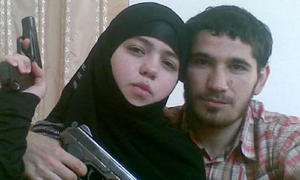Suicide bombingSuicide bombers: expedient tactics, not expression of Islam
New study argues that female suicide bombing is a political and military tactic, not a religious act; according to mainstream scholars of Islam, the Qur’an, the Hadith (traditions and practices of the Prophet Muhammad), and other principles of Shari’a (Islamic law) clearly condemn terrorist acts and oppose suicide operations; in order to justify suicide bombings, leaders of Hamas, Palestinian Islamic Jihad (PIJ), and al Qaeda have formulated their own interpretations of Islam, which are based more on military strategy than theology

Moscow suicide bomber with her husband // Source: worstsinners.com
Terrorist groups bend the rules of “true” Islam to justify the use of female suicide bombers, according to Margaret Gonzalez-Perez from Southeastern Louisiana University. Her paper traces the development of radical Islamic doctrine over time, highlights how it deviates from mainstream Islam, and identifies the building blocks that have culminated in Jihadi female suicide bombers. According to Gonzalez-Perez, “Radical Islam reinterprets, and even misinterprets Islamic jurisprudence, as a tool to legitimize female suicide bombers.” Her findings are published online in Springer’s journal, Gender Issues.
A Springer release notes that according to mainstream scholars of Islam, the Qur’an, the Hadith (traditions and practices of the Prophet Muhammad), and other principles of Shari’a (Islamic law) clearly condemn terrorist acts and oppose suicide operations. In order to justify suicide bombings, leaders of Hamas, Palestinian Islamic Jihad (PIJ), and al Qaeda have formulated their own interpretations of Islam, which are based more on military strategy than theology. This is particularly apparent in their attempts to portray female suicide bombing as consistent with Islamic doctrine, according to Gonzalez-Perez.
She identifies a two-stage radicalization process, the origins of which she traces back to the thirteenth century.
The gradual radicalization of Islam began in the Middle Ages with some individuals claiming the right to interpret religious law and decide for themselves when war was justified. These ideas led to the justification of suicide bombers as a form of Islamic martyrdom under the interpretation of Iran’s Ayatollah Khomeini (1902-89). Further radicalization enabled the justification of female suicide bombing. The Qur’an, however, does not include women as soldiers and explicitly categorizes women and children as non-combatants. According to Gonzalez-Perez’s analysis of the emergence in 2000, and rise since, of female suicide bombers, they are merely a military tactic, rather than a religious act.
In the author’s view, terrorist groups recruit women by exploiting vulnerable females, including some with mental health issues and girls as young as fourteen. The common profile of female suicide bombers is that of a woman trying to survive in the aftermath of a war with no political, economic, or social security. Understanding female suicide bombers, their motivations, and their uses can be helpful in developing counter-terrorism strategies.
Gonzalez-Perez concludes: “The decidedly un-Islamic introduction of female suicide bombers is hardly surprising in current terrorist groups, for they simply reinterpret and manipulate religious doctrine to legitimize acts that are strategically and militarily utilitarian. Female suicide bombers are not Islamic martyrs nor any other manifestation of orthodox religious faith.”
Reference
— Read more in Margaret Gonzalez-Perez, “The False Islamization of Female Suicide Bombers,” Gender Issues 28, nos. 1-2, 50-65 (20 April 2011) (DOI: 10.1007/s12147-011-9097-0)
